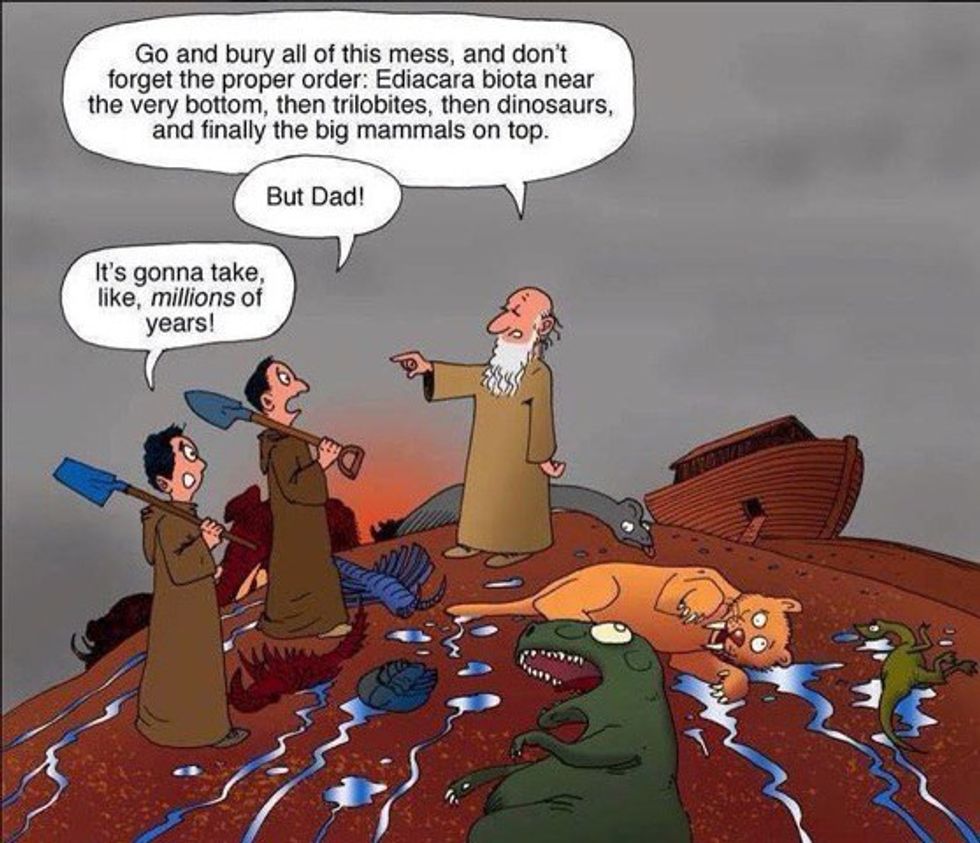I was scrolling through my social media the other day when I came across a one-panel comic about Noah's Ark. As with the usual religiously themed joke, I expected to get a chuckle from some naive slant on the biblical narrative and go about my way. But this was different.
It featured a tyrannical Noah atop a soggy hill of dead animals, commanding two of his sons to dispose of the bodies. "Go and bury all of this mess," said Noah, "and don't forget the proper order: Ediacara biota near the very bottom, then trilobites, then dinosaurs, and finally the big mammals on top."
"Ooh," I thought, "politics within the scientific community; my favorite!" The cartoonist was using parody to apply a straw man argument to critique Creationism's theory of the Great Deluge (aka the Big D, or the Worldwide Flood). While the geologic interpretation of the Great Deluge would not be incompatible with the Evolution Theory, almost all catastrophism has been sworn off in favor of the principle of uniformitarianism. More politics! Charles Lyell popularized this principle in the early 1800s, suggesting that Earth's tectonics have always functioned in the same rate and manner since the beginning. Therefore, no major continental shifts or significant floods and subterranean volcanism beyond that which is observed on a daily basis should ever be inferred from the geologic evidence.
Lyell's Principles of Geology was "a powerful mixture of argument and rhetoric," says Perdue's online entry on uniformitarianism.
"Lyell self-consciously aimed to present his brand of uniformitarianism as the scientific way of doing geology. But many of his opponents, including the so-called 'catastrophists,' were also reputable scientists: e.g., Cuvier, Whewell, Agassiz, Buckland, Sedgwick, Murchison. It is wrong to think that Lyell's critics were religious fundamentalists..."
Nonetheless, the contemporary scientific community has more or less unanimously accepted uniformitarianism, whereas all forms of terrestrial cataclysm have been swept under the apostate rug of Creationism.
The result: a widespread misunderstanding of how geologic evidence can suggest cataclysm, specifically the Great Deluge. So if catastrophists do not claim that Noah buried the animals in a specific order, how can we account for the frequently similar order of fauna distributed among the strata?
The famously outspoken comparative physiologist Dr. Walter Veith gives this illustration in The Genesis Conflict:
"The sequence from sessile to free-swimming to terrestrial is indicative of ecological zones being destroyed progressively as can be illustrated by a simple example. If a bulldozer rapidly covered a duck pond with soil, then the organisms in the pond would be buried in sequence. The bottom dwelling worms and snails would be at the bottom, the fish somewhat higher, and the ducks on top" (p. 109).
This would also account for the fact that the animals were buried quickly, allowing for fossilization. Without being swept up in an instantaneous burial, we would not have the fossils and oil that we see today. But wouldn't massive flooding and mud slides simply mix up all of the bodies into a jumbled mess? Not necessarily. Veith elaborates:
"Indeed, we find assemblages of fossils in the same sequence in the fossil record as they occur in a present day ecological zonation. The ability to float or not would also produce zonation. Mammals and birds float due to bloating or trapped air in the feathers and hair and are thus to be found in higher strata" (p. 109).
Coal also shows the same categorization. Veins of coal found in the Paleozoic stratum are made up mostly of non floating plant matter. Coal consisting of floating species make up the deposits found in higher strata (p. 109-110).
Looking through the uniformitarian lens, the animals would have necessarily been fossilized on a peaceful Earth's surface. Then the floaters would have had to mysteriously float through time to rest on a surface supposedly separated from that of the sinkers by millions of years.
Through the catastrophist lens, either there was massive flooding or Noah had a bulldozer.




















